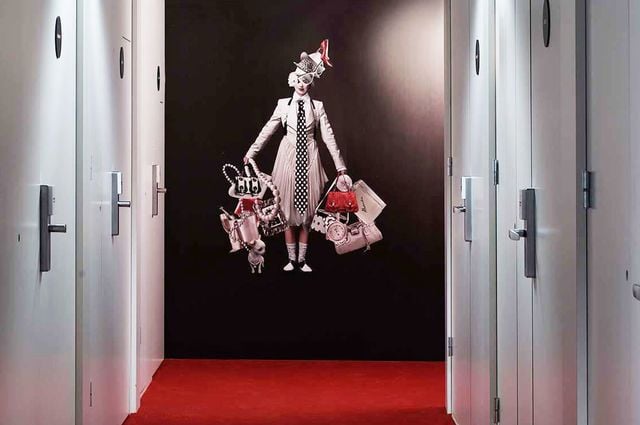Attribute Based Shopping - A blessing or a bane?
11 experts shared their view
While attribute based shopping has been discussed for over 10 years, the level of noise about its application for the hotel industry has significantly increased in the last 18 months. After significant investment in new systems and technology, companies like IHG are tipping their toes in the ABS waters. While some tout the great benefits (and revenues) expected by offering customers more choice, others take a more cautious approach, questioning the expected benefits and ROI. What is your take on ABS, will it do what it did for the Airline industry - boost ancillary revenues, or will it be the "3D TV" of Hotel Technology.
Are Hotels Finally Ready to Embrace Attribute-Based Selling?
While ABS is something which comes naturally in the airlines model, where customers already expect to pay for certain variables, in the hospitality it cannot be taken for granted. Just because it worked for airlines, it doesn't mean it will for the hospitality industry.
Let's look at the case of the Malaysian hotel group, Tune Hotels (founded by the low-cost airline AirAsia co-founder, Tony Fernandes), a no-frill budget hotel chain. Here guests, starting from a very low rate, could add on accessories (blankets, towels...), more consumption, even a window in room! Just a few years later, Tune Hotels in London closed and got rebranded; in the TH official website, it states today: “We're All In! No more top-ups or add ons”. Why that?
Honestly, I believe more in a great SPA, a decent Restaurant, other few amenities as strong drivers of revenue for a hotel. While in the room, the most distinctive feature for additional revenue today is its own flair. I also believe in the customer's journey and its different purchasing needs at different times, which could be, one day, controlled by some big tech players.
But I am still not convinced by ABS for hotel rooms and ABS as the way to personalization. Open for a different view.
Customers don't buy attributes, customers buy solutions to their problems. What customer problems could ABS solve? How could ABS make customers' lives better or easier? The fate of ABS will depend on the answers to these questions.
What customer problems could ABS solve? To answer this question, hoteliers should focus on their customer personas, personas' lifestyles, and reasons to visit the destination. A family traveling with an infant needs more than a baby crib, and will pay for the extra amenities such as baby bathtub, baby bottle sanitizer, etc. To make customers' lives easier, Westin Gear Lending program enables travelers to maintain their travel routine without carrying their sports gear, while a Westin Workout room let travelers use fitness equipment in their rooms. Hence, monetization opportunities are not much about rooms' physical attributes, but addressing customers' problems.
Focusing on monetizing attributes may create a dilemma. Hotel rooms can be differentiated based on a very limited set of attributes, such as a king or queen bed, high or low floor, near or away from elevators, shower or bathtub, different views, etc. Even if customers could configure their own rooms, they may not perceive this opportunity as value-adding. On the other hand, high-end properties may offer more attributes or features, but their customers probably do not want to invest their valuable time to configure, while hoteliers want to avoid showing the price of every attribute.
Nerveless, the technology developed for ABS will be a blessing. When hoteliers think outside of the box (hotel), identify services or amenities helping customers solving their problems, then these services or amenities could be booked and confirmed through ABS. What about booking a hotel room with two beach chairs and an umbrella? Anyone?
Attribute Based Shopping (ABS) is a good start, but I believe One-to-One Pricing, powered by AI will be the absolute winner for both travel consumers and hoteliers. ABS is already a departure from the current revenue management one-to-many pricing approach, but 1to1 Pricing will take this to an entirely different level.
One-to-One Pricing and AI will allow hoteliers to automatically personalize pricing and product offering to the individual customer level and take into consideration dynamic factors such as customer's preferences, browsing behavior, influencer status, “intent to purchase” intensity, and of course the more mundane factors like RFM value, loyalty member status, past booking history and demographics.
Where ABS could be a game changer is in search, recommendations and in pricing. Too many are focused at how this can be a method to sell ancillary revenue, like the airlines did. But the application in hotels could be totally different. Pricing intelligently based on features would be mainly an RMS level use of ABS. Guests would still see and book a final price, but the room price would be build by pricing the features within the rooms.
Recommendations algorithms need more attributes to improve the results, current models are too limited. And automatic attribute assignment doesn't take into account that some attributes have limits and thus would inventory needs to be distributed.
The deployment however will require that either Google or a major OTA move first to push the various tech levels of the industry to build the APIs and inventory and price management for these.
I don't think it is a question of if it happens but more when it happens.
I love the customer-centred vision at the heart of ABS. The promise of 'infinite SKUs' and stay packages that are experience-led rather than room-led is intoxicating. For many hotels, the digital sophisticates, these new capabilities will likely be put to good use. For other hotels, I suspect the rewards of ABS are many years away. The practical challenges of delivering a web of attributes in-house, the complexities of correctly pricing both rooms and attributes and the organisational inertia will stymie many optimistic ABS initiatives. I hope that the early adopters will quickly identify a killer app for ABS that the rest of the market can follow. In the meantime I'd suggest hotels start to experiment with upsell technologies (like Oaky) as a half-way house and opportunity to identify what attributes their guests will pay more for today.
First of all, let's start by explaining what attribute-based selling is not: I recently came across an article by a colleague, and I realized that there's still a huge misconception on how an ABS' industry would look like. Some people believe that, by overloading travelers with choices, the booking journey's complexity will increase (and conversion drop), when quite the opposite is likely to happen.
Attributes have the potential of making the act of choosing obsolete and unnecessary: if virtual travel assistants could access more data than just ARI, they'd be able to filter the noise out on behalf of the traveler. Today's filter-bubble frustration will be a thing of the past, ergo, conversion WILL increase.ABS is not about humans swimming in an ocean of choices, rather the other way around: in an attribute-based industry, in fact, my GoogleHome could (based on my travel preferences and habits), pick the most suitable accommodation for me.
I always use the Netflix's comparison to explain ABS: as you don't browse hours to pick a show to watch (instead you let machine learning do the dirty job for you), thanks to ABS, travelers could finally get rid of the most frustrating part of the travel journey: its preparation.
So my answer is: pretty much any other industry out there is already using attributes with great success, why should we always be the laggards?
Attribute-Based shopping? Customers and technology may be ready, not hotel managers! It's pretty clear that from a customer perspective, being able to choose the desired room amenities, pay the hotel according to this choice, would be the ideal experience.
On the other hand, managing these attributes in the operation of the leading hotel chains it's still pretty utopic nowadays. I think that hypothetically, in one year or two, the main technology providers could be able to create a propriety management system able to operate with a few basic attributes for the ABS distribution. At that point then, the main problems would be two: First, the top b2c sellers (read Otas, metasearch) may not be ready for such type of shopping experience. Knowing the approach of these big .COMs, if they may introduce ABS mode, they would do it "their way", laying down their own rules and not caring about hotels operations and previous tech development. Chains may want to wait for the big sellers to make the first move. Secondly, the main issue about the ABS model is BIG DATA management. Abs means a constant and high-frequency feed of data to manage and, most of all, to predict. The hotel chains top managers are usually not data scientists. They delegate this kind of maths to their revenue manages. These professionals use data tools at their service; understandably they don't intend relinquishing the control of their operations. Indeed with the ABS model, the kind of data flow that may come out is not manageable by humans. Only Artificial Intelligence predictive analytics could handle these operations and produce the desired results. Revenue managers and hotel executives are not ready to "let the machines" genuinely manage their data. They talk about it, listen to conferences, use tools that have some little fancy Ai features, but they don't want to step back. I see it with my AI startup Profiter: when you ask to the leading hotel chains to do a small, limited, conservative test of Ai based distribution, they say: "yes, great, we're very interested. We'll let you know". Then they lock themselves in the closet of their office waiting that you walk away and hoping that this thing would never arrive. ;-)
We at Hudson Crossing have been working hard on attribute based shopping concepts since 2017 and we believe that ABS represents a fundamental, and highly lucrative, shift in the way hotels will distribute products in the coming years. Further, this shift will take a lot of effort for hotels, but we'll argue here that outsize rewards will accrue to early adopters.
Hotels have traditionally moved very slowly when changing their distribution fundamentals, especially with respect to their technology. Remember the first promises for a converged CRS and PMS from the early 1990s? It's finally here! But while hotels like to move very deliberately, technology itself has no such compunctions, and companies that want to leverage modern methods are zooming ahead of legacy providers. For example, look at what Cloudbeds is doing to PMS and Tripactions is doing to corporate travel. These are new market disrupters who are using technology to not only wedge their way into a legacy-dominated market, they're also using that new technology to work their way upmarket quickly.
Why mention disrupters in a piece about ABS? To highlight that the hotel industry's days of waiting, and waiting, and waiting to see what happens, are O.V.E.R. Just as modern technology like micro service platforms running on public clouds are letting the hotel-tech Davids slay their Goliaths in bunches, the tools they're using are letting more technologically savvy hotel companies leapfrog bigger competitors— and this time the chances of the laggards eventually catching up are just about nil.
Here's one way to think about it:
·If you agree that ABS will provide a purchasing experience that at least some customers will prefer, then there will be some hotels that will provide it as the technology becomes more readily available.
Among the distribution companies with whom we've explored ABS, only Amadeus currently appears to have a production-ready, enterprise class distribution system with real ABS, but others are already offering smaller scale ABS engines. (We say 'real' here because there are lots of distribution companies, including some of the largest hotel companies in discussing their proprietary systems, who are touting ABS but are actually delivering attribute based filtering. If you're not sure of the difference, take a look at our ABS white paper at Hudsoncrossing.com for a discussion of the differences.)
·If some hotels will be distributing their products with ABS, then those hotels will have an advantage in driving customers to direct channels and in how they appear in meta channels.
Why? For technical reasons around the way that rooms are system-assigned in an ABS world, it will be exceedingly difficult to provide ABS through a channel that relies on local ARI caching. That means larger OTAs, wholesalers, and the like will not have access to the ABS experience (or, at best, just a small piece of it) and travelers who want to use ABS shopping will have to come directly to hotels to get it. We believe travelers will be very interested in using ABS for a variety of reasons—it will not just be a small group of price shoppers.
As for the advantage in meta channels, think about what happens in the display when non-ABS hotels are showing prices for their traditional products next to the ABS hotels that are able to show the price for their basic, “bed only” option. It's like the OTA/meta airline displays back when network carriers were showing their main cabin prices next to low cost carriers who showed basic economy. Incidentally, how did network carriers compete with the LCCs? They implemented the airline equivalent of ABS and started selling fare families and individual 'attributes' of the flight.
It's not a great leap of faith to see that ABS is already in place, is progressing, and that hoteliers that adopt it will have a distinct advantage in the marketplace vs. those that don't. There is another piece of ABS that hoteliers need to think deeply about: the risk of delay. In a world where technological advances like converged CRS-PMS have taken 25 years to appear, hotels have become very comfortable with the approach of “let's wait a couple of years and see how this plays out.” While that's worked before, we'd argue those days are over for ABS and are likely over for all hotel tech initiatives. There are many reasons for this, but we'll offer two that apply especially to ABS.
1.As many have noted, ABS is a big change in the way hotel products are offered and the ramifications in hotel distribution are very substantial. Over time, hotel companies will rethink just about every aspect of distribution and associated systems such as RMS, CRM, and loyalty as the opportunities enabled by ABS emerge. For most hotel companies, this is something that will take years to deliver from the date when everybody puts hand to heart and jumps into the ABS world. Said differently, there is no way to wait a few years and then get on an already moving train. If you wait those years, you will be starting essentially at square one when you finally agree to move forward—and the early adopters will be years ahead.
2.As we outlined in our ABS white paper, once hotels have an ABS-aware distribution system and and ABS-aware revenue management system (another wholesale rewrite) they will be able to create offers based on personalized attribute bundles rather than the old, blunt instruments of room types and rate plans. That personalization will require a new type of CRM (or possibly CDP, or customer data platform) to create the bundles and the capabilities of these next-gen RMS and CRM/CDP systems will be way beyond the ability of humans to steer directly. In the same way that todays pilots manage computers that actually fly the planes and surgeons manage computers that perform complex surgeries, hoteliers will depend on AI-driven RMS and CDP systems that learn how to manage offers and prices based on the data that passes before them. That data will be what makes these system perform better every day, and you won't be able to collect that data to feed these systems until you start operating in an ABS world, but once you do, the capabilities of the AI will get exponentially better.
To summarize, it doesn't take a leap of faith to see that if at least some companies adopt ABS, then those that don't will be at a disadvantage. Further, and possibly more important, adoption delays today will have disastrous effects in the future. It will take several years to get the distribution-connected systems like RMS and CRM ready to function in an ABS world and ready to start collecting data. Once the more forward thinking hotel companies start collecting that data for their price optimization and personalization AI, they will move ahead of the laggards at an accelerating rate.
For customers who know what they want, attribute-based sales approaches are an attractive capability that allows travelers to customize their stay to a much greater extent than is afforded with room types alone. If done well, it can increase conversion, increase revenue, and increase utilization of unique room types.
Technology is critical to making the discovery and booking process simple. A more open and dynamic pricing strategy is important to be able to independently price inventory and personalize the process based on past customer behavior.
However, challenges remain. Operationally it requires hoteliers to clean specific rooms by check-in time rather than having more flexibility to manage run-of-house rooms. On the tech side, it requires specific, two-way integrations between several systems.
I'm torn. In saying that I'm certain it will become mainstream because airlines have taught the customer this is a level of normal behavior. Although my personal position is that I feel it removes a level of hospitality and may bring about a race to the bottom. Hotels and resorts are not airlines.
What is an attribute? Is it an ancillary revenue item? Is it an item of inventory? Is it both? I've heard some speak about bed sizes, bathroom types, room locations. These have been part of the room matching experience technically since I began in the industry. We paid attention to the customer and kept the information on hand behind the scenes. We called it observing the guest and the art of anticipation - service. A cute term in today's self service mode. The intelligence to assign rooms accordingly is also old. The hotel is built once and you cannot effectively change the bedding configuration - hence the concept of a room type. Is WiFi an attribute? No intelligent hospitality technologist is going to build a campus WiFi solution for part of their inventory. It's there. It's already factored in to the cost of sale for the room. To attribute such a thing is a revenue gouge as compared to a customer choice. Perhaps WiFi that works is an attribute! I digress.
Technology has existed above and on property to facilitate this type of functionality for quite some time in PMS, CRS in real time and more importantly customer information and loyalty platforms.
If an 'attribute' is truly ancillary products that are not being leveraged or sold effectively today then I approve as this is a major gap for the industry. If it is picking and choosing and monetizing nuances the customer already receives as part of the hospitality product then I see it for what it is.
In speaking to a good friend close to this he suggested to me that it's about the inventorization of other products. It could be anything. Now we are talking! This, I am in favor of having a background of across operation sales platforms for all products. Everything in one location, inventorized and guaranteed. This means a consolidation and standardization of inventory, pricing and revenue structure and management throughout the distribution environment. Also a massive shift in pricing optimisation and the idea of what a hotel or resort product is. The entire offering. Not just rooms. Some significant technology shifts.....
It's in my view the only way forward to the next generation of hospitality operating platforms where operational processes and the guest experience become aligned. Rooms, Lifestyle elements, Transport, Retail items, Dining reservations, Transportation and third party products. From inventory. Real time. Guaranteed. This is what we always had in mind when dreamed of 'Build Your Own Package'.
To me, this is what represents 'attributes' by comparison to what has been known as Room Features. It requires a fundamental change in what a property/hotel/CRS/customer information, loyalty and booking platform means. If it told you that it exists today what would you say..?
Perhaps this is the catalyst to bring us to that utopian operating model!
Will it do what it did for the airline industry - increase sales of products they could not effectively sell before? Yes. The remaining question is how our industry will approach the 'products' we choose to sell. For the most part I'm only seeing focus on Rooms. A limited view that misses the boat on the real opportunity to grow revenue and increase choice for genuinely valuable products.
It is undeniable that consumers want a better, more relevant experience. Accustomed to frictionless browsing and shopping experiences from the likes of Amazon, Uber and AirBnB consumers are expecting the same from their preferred Hotels. Being able to customize and curate a highly individualistic experience will become a key differentiator and attribute based shopping (or as I like to call it Customer Choice Shopping) will enable Hotel companies to match the consumers desire with their offerings at an unprecedented level.
Consumers should be able to pay for only/exactly what they want (view, location, services, amenities) and construct their own experiences if they want, and hotels should be able to offer individual 'attributes' of the experience at a dynamically generated price. I believe in one way or another, a more or less sophisticated form of ABS is inevitable.











